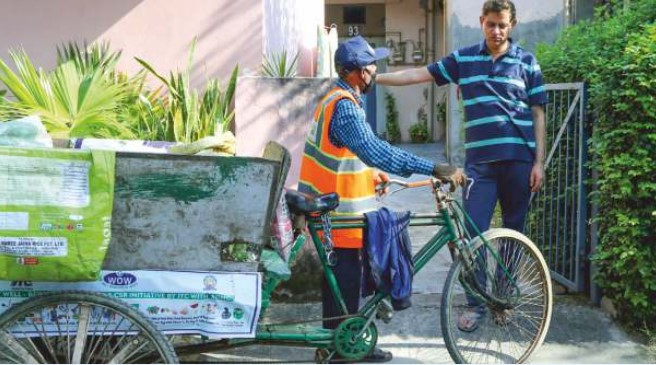As part of our #LetsTalkCSR series doing a deep dive into social initiatives by top corporates, let’s explore the CSR of ITC. The Group headquartered in Kolkata sits proudly on our list of top companies for CSR in 2020. Another report by Goodera ranked ITC Limited as the 7th largest spender on Corporate Social Responsibility in India for 2019.
While the company’s CSR spend was a steep Rs. 307 crores that year, in 2020 it rose to Rs. 326 crores. CSR of ITC Group has long-running, multi-year projects in six of the 11 activities of Schedule VII, including the often-neglected culture and national heritage.
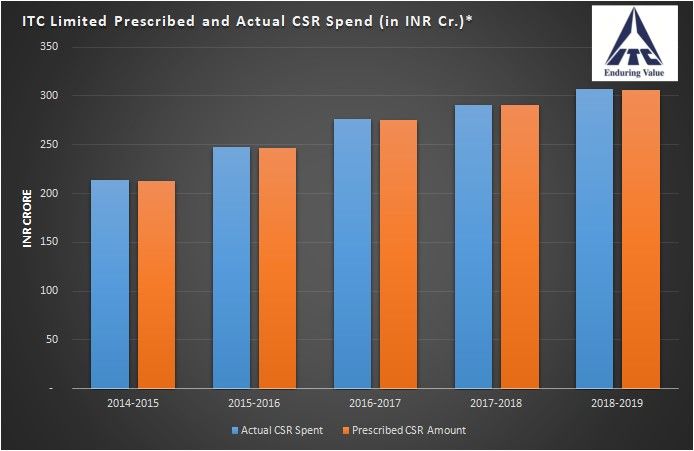
Ashesh Ambasta, executive vice-president and head (social investments) said in an interview, “The CSR activities of ITC are focused on two stakeholder communities: rural communities with whom ITC’s agri-businesses have forged enduring partnerships, and with communities residing in close proximity to our production units.” Indian Tobacco Company (formerly Imperial Tobacco Company of India Ltd.) is one of India’s foremost private sector companies and a diversified conglomerate with businesses spanning FMCG, tobacco, hotels, packaging, agri businesses and IT.
ITC is acknowledged as one of India’s most valuable business corporations with a market capitalisation of nearly US$ 50 billion. It was ranked India’s most admired company, in a Fortune India survey.
Interventions related to COVID-19
In line with its commitment to put Nation First and responding to the needs arising out of the unprecedented lockdown implemented to contain the COVID-19 pandemic, ITC has spearheaded a CSR initiative to enable the creation of an eco-system that would lead to significant livelihood generation for farmers and daily wage earners under the ambit of the Government’s MGNREG Scheme.
Said Sanjiv Puri, Chairman, ITC Limited:
“As the pandemic unfolded, ITC responded with agility, resilience and compassion to adapt to the new normal. A COVID Contingency Fund of Rs. 215 crore was set up to address the needs of the distressed. Together with local authorities, a combination of cooked meals, food and hygiene products were also distributed across 25 States and Union Territories. We also extended financial support to our supply chain partners for obtaining a COVID-19 Insurance Cover for their associates, covering hospitalisation and diagnostic expenses.”
S Sivakumar, Group Head of ITC’s Agri Business said, “Inspired by its credo of Nation First: Sab Saath Badhein, ITC, in collaboration with district administrations and NGO partners, is enabling the rural workforce in the catchment of its operations to access income-generating opportunities under the MGNREG Scheme. The objective is to scale up this programme by extending it to more regions in these unprecedented and challenging times.”
CSR initiatives in the second wave of COVID-19
From oxygen cryogenic containers to oxygen concentrators and generators, ITC is working towards mitigating the current crisis in oxygen supply in the second wave of Covid-19.
To serve the national priority of easing the bottleneck of transporting medical oxygen, ITC tied up with Linde India to airfreight 24 cryogenic ISO containers of 20 tonnes each from Asian countries in order to transport medical oxygen across India. The CSR initiative comes in the wake of an acute shortage of medical oxygen, constraining the healthcare system’s ability to treat coronavirus patients.
In addition, ITC is airlifting a large number of oxygen concentrators for distribution. The group’s paperboards unit in Bhadrachalam has commenced supply of oxygen to neighbouring areas.
Makeshift hospital
ITC corporate social responsibility is extending support, including the arrangement of beds, monitors, oxygen, furniture, and initial medical supplies towards setting up a makeshift 200-300 bed medical facility in Kolkata managed entirely by Medica Superspecialty hospital that will treat covid-19 patients. The medical facility is meant for the treatment of Covid-19 positive patients and for administering vaccines. The government of West Bengal has permitted the use of Kishore Bharati Stadium to set up this medical facility.
As part of this assistance, ITC will extend financial support to Medica for setting up this facility which will encompass the cost of creating it, arrangement for beds, monitors, oxygen, furniture, air-conditioners and initial medical supply.
1. Sustainability and CSR of ITC
ITC’s journey in sustainability is inspired by its large vision to put the ‘Nation First’. Towards this end, it has adopted a comprehensive CSR policy outlining measures to undertake projects and activities for making a significant impact on the marginalised.
The footprint of the Company’s Social Investments Programme (SIP) projects covers vast ground ― over 27 States / Union Territories covering 235 districts (some, under the government’s high priority Aspirational District Programme). ITC Group’s CSR expenditure incurred under Section 135 of the Companies Act, 2013 amounted to INR 307 crores in 2019 (it was INR 291 crores in 2018).
2. Key goals aligning with SDGs
Due to the Triple Bottom Line approach that ITC Limited follows and its commitment to ‘Nation First’, the enterprise contributes to India’s targets towards the Sustainable Development Goals (SDGs) set by the United Nations:
– Creating sustainable livelihoods for 10 million Indians by 2030.
– Expand social investment programmes to empower rural communities.
– Sustain and strengthen the human capital capability to achieve business goals and enhance ITC’s standing as a top employer through purpose-driven investments in people development and talent management practices.
– 50% of total energy would come from renewable sources.
– Make ITC a carbon, water and solid waste recycling positive organisation.
– Target of 50% reduction in Specific Emissions and 35% reduction in Specific Energy Consumption by the year 2030
– Benchmark operations for Specific Water Consumption to Global Standards.
– Rainwater harvesting equivalent to over 3 times the net water consumption from operations by 2030.
– Target making 100% of packaging reusable, recyclable / compostable.
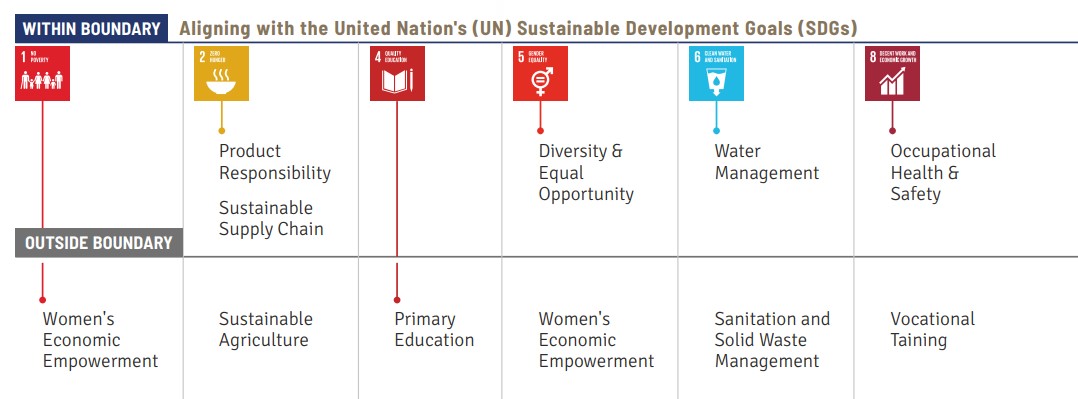
3. CSR Policy
Recognising that business enterprises are economic organs of society and draw on societal resources, it is the Group’s belief that a firm’s performance must be measured by its Triple Bottom Line contribution. ITC believes that the private sector possesses―beyond mere financial resourcesy―the transformational capacity to create game-changing development models.
In line with this belief, it has been crafting unique models to generate livelihoods and environmental capital. Such CSR projects are much more replicable, scalable and sustainable, with a significant multiplier impact on livelihood creation and environmental restoration.
It is ITC’s policy:
– To formulate CSR Programmes towards achieving one or more of the following:‒ enhancement of environmental and natural capital; rural development support; promotion of education; preventive healthcare, sanitation and drinking water; creating livelihoods, especially for those from disadvantaged sections of society; sports promotion;
– To develop self-reliance among people at the grassroots, especially women, since these are prerequisites for social and economic development;
– To pursue affirmative action interventions like skill building and vocational training, thus enhancing employability and generating livelihoods the disadvantaged;
– To carry out CSR Programmes primarily in areas that fall within the economic vicinity of the Company’s operations so as to supervise them closely and ensure maximum impact;
– To promote sustainability in partnership (SDG 17) with industry associations, like the Confederation of Indian Industry (CII) through the CII-ITC Centre of Excellence for Sustainable Development, the goal being a multiplier impact.
3.1. Governance
– Every year, the CSR and Sustainability Committee will present a strategic CSR Plan delineating the projects to be taken up during the year and the specified budgets thereof, for the Board’s approval. The Board will mull over and then approve the CSR Plan with the necessary modifications.
– The Corporate Management Committee (CMC) will assign certain persons/ bodies with the task of implementation of the CSR Plan, within specified budgets and deadlines.
– The implementation persons/bodies will carry out the CSR Programmes as directed by the CMC and frequently report back on the progress.
– The CMC shall review the implementation of the CSR Programmes once every three months and issue necessary directions from time-to-time to make sure things are in accordance with the CSR Policy.
– Every six months, the CMC will give a detailed status update to the CSR and Sustainability Committee on the progress of approved ITC CSR projects. The CSR Committee of ITC will keep the Board apprised of the same.
– The CSR and Sustainability Committee will submit its report to the Board at the end of every financial year.
3.2 CSR Expenditure
CSR expenditure includes all direct and indirect expenses incurred towards ITC corporate social responsibility programmes. Moreover, any surplus arising from any CSR programme shall again be redirected towards CSR. Accordingly, any income from ITC CSR projects will be netted off from the CSR expenditure and that amount will be reported as corporate social responsibility expenditure.
4. Strategic CSR of ITC
Social investment is as crucial for this company as its growth investments, hence its large-scale Social Investments Programmes (SIPs in short). SIPs are the backbone of MSK (Mission Sunehra Kal). MSK aims at building rural capacity in partnership with local communities to develop water and forest resources, open up new non-farm livelihoods, empower women, expand primary education, and drive future skilling in India.
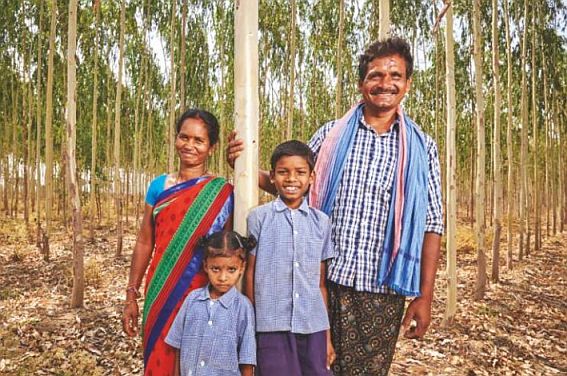
4.1 Key elements of ITC CSR initiatives
– Strengthen capabilities of nonprofits, NGOs, CBOs (Community Based Organisations) for planning, ownership and sustainability of interventions in all the project catchments.
– Drive India’s development agenda in a way that benefits the poor and marginalised communities in ITC Group’s factory and agri-catchment areas, in ways that improve HDI (Human Development Indices).
– Enabling participation, contribution and asset creation for the whole community where the project is being implemented.
– Striving for scale by leveraging government partnerships and accessing up-to-date knowledge and technical information.
5. Social Forestry
This ITC CSR programme focuses on creating commercially viable land-use options for smallholder farmers through tree-based farming. In addition, it contributes towards 3F security, such as food, fodder and fuelwood.
The conglomerate’s pioneering afforestation initiative through the Social Forestry programme is spread across 16 districts in six States covering 3.29 lakh acres in 5,087 villages, impacting over 1,21,557 poor households.
Together with the Farm Forestry programme, this CSR initiative by ITC has greened nearly 7.33 lakh acres till date, and generated about 135 million person days of employment for rural households. The Agro-Forestry initiative is integral to the Social Forestry programme. It extends to over 1.12 lakh acres and ensures food, fodder and wood security.
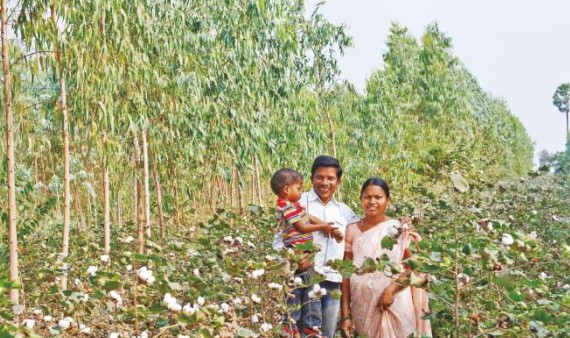
Besides enhancing farm level employment and increasing green cover, this large-scale CSR project of ITC Group also contributes meaningfully to the Indian government’s endeavour to make additional carbon sinks. Through a multiplier effect, the Social and Farm Forestry initiative has led to improvement in pulpwood and fuelwood availability in the states of Andhra Pradesh, Telangana, Karnataka, Chhattisgarh and Odisha. In Tripura state, this initiative is also creating bamboo wood source, which is most suitable for making incense sticks.
6. Soil and Moisture Conservation
The Soil and Moisture Conservation initiative strives for water security for all the stakeholders inside the factory catchments. Another goal is to drought-proof the agri-catchments. The initiative develops and manages local water resources in moisture-stressed areas by facilitating community participation for measures like building, reviving and maintaining water-harvesting structures. The coverage of this programme currently extends to 43 districts of 15 States.
7. Biodiversity
Nature provides agriculture with ecosystem services such as natural regulation of pests, pollination, nutrient cycling, soil health retention and genetic diversity. However, they’ve been considerably eroded over the past few decades. ITC’s biodiversity initiative aims to revive them.

This CSR intervention significantly upgrades agricultural activity near village plots through soil moisture retention, carbon sequestration and by playing host to insects and birds.
7.1 Revival of ecosystems
ITC has collaborated with the IUCN (International Union for Conservation of Nature) in Bihar’s Munger region to develop ‘Sustainable Agriscape for Future’. IUCN carried out a number of studies and surveys to identify key issues.
Pressures on the forest for fodder and wood for fuel from villagers had led to top soil erosion, invasion of exotic species in community water bodies, excess usage of external input in farms along the Ganga river, fewer native trees and shrubs that sustain birds and insects. These were critical factors that would impact the agriscape ecosystem service potential. Based on these findings, IUCN has suggested three landscape profiles: forest and lakes, lacustrine, and riverine (Ganga riverbed) landscapes.
Team CSR of ITC Ltd. developed plans for all three types of landscapes, based on the recommendations by IUCN. Work is in progress on a pilot scale. Actions include creating a source for fuelwood and fodder within the villages by planting suitable native tree species, hyacinth-based composting to reduce its growth in lakes, planting native trees along the Ahar and Pyne banks, and planting multi-tiered native trees on fields near the Ganga to minimise damage by floods.
8. Sustainable Agriculture
The programme focuses on strengthening resilience of small and marginal farmers to climate risks by reducing cost of cultivation, improving productivity, and restoration and replenishment of depleted natural resources. The Sustainable Agriculture initiative makes farmers climate-smart.
The group’s Agri Business has pioneered the ‘Village Adoption Programme’. It covers 250 model villages in Andhra Pradesh, Karnataka, Telangana and Rajasthan. This initiative is aligned with Prime Minister Narendra Modi’s SAGY (Sansad Adarsh Gram Yojana) for holistic rural development. The Company extensively trained 402 block level agri-officers who became Master Trainers, and in turn trained 2,259 village level personnel to become Village Resource Persons (VRPs), who go on to teach farmers. VRPs have trained 2.05 lakh farmers in sustainable practices for their region.
8.1 Partnership with NITI Aayog for Aspirational Districts
The Indian government’s Aspirational District Programme (ADP) seeks to transform the most backward districts in the country. ITC has a partnership with NITI Aayog to enhance the agriculture and allied sector in 27 Aspirational Districts of 8 states. The modus operandi is capacity-building of officers of the Department of Agriculture, which will trickle down to the farmers. Scientists from agriculture universities and Krishi Vigyan Kendras (KVKs) developed the training kits. They’ve been localised into Hindi, Marathi, Assamese and Odiya.
Since the project’s launch in September 2018, there is remarkable progress:
– NGO partner VIKSAT trained 402 block level agri-officers as Master Trainers;
– They coached 2,259 village level staff as VRPs to train farmers.
– The VRPs have worked with 2.05 lakh farmers.
– 675 Farmer Field Schools were promoted, creating a pool of 16,900 “champion farmers”.
8.2 What is ITC e-Choupal?
ITC e-Choupals leverage the power of Information Technology. Internet-kiosks called “sanchalaks” in the village are managed by appointed farmers. These sanchalaks provide information to other farmers in their native tongue on weather forecasts, market prices, scientific farm practices and risk management. As a result, farmers can make informed decisions, and experience higher productivity. They get inputs from established manufacturers at fair prices.
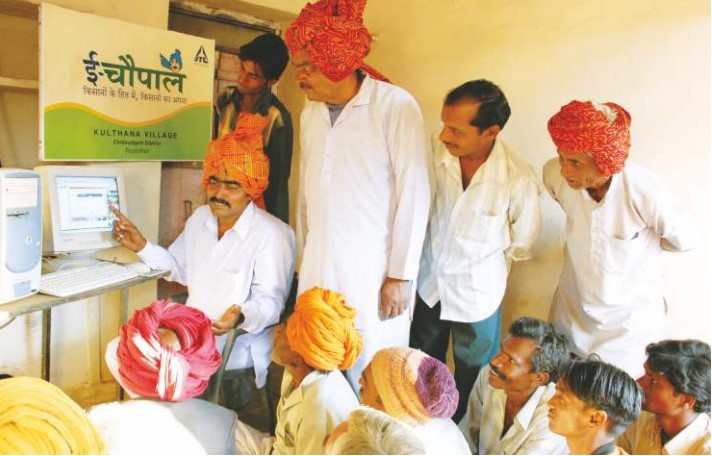
Since its launch in the year 2000, e-Choupal by ITC has gone on to become the largest internet-based intervention in rural India. With 6,100 kiosks spread across 12 states, it reaches out to 4 million farmers pan-India.
Higher price transparency and lower handling and commission fees increase the farmers’ margins by over 25% on average and, in the 15 years since its implementation, CSR of ITC has directly reached 4 million farmers across 40,000 villages and has grown its export sales by more than 600% to $600 million annually.
In 2002, the company launched its packaged foods business, which grew to $1 billion in revenues by 2015. Despite being a late entrant in the market, its flagship brand of wheat flour, Aashirvaad, became a market leader within 18 months of its launch. e-Choupal was instrumental in this regard because it allows the company to aggregate produce by crop variety and quality to create customised flour mixtures. Farmer incomes increased significantly as a result – both because those who grew superior-quality wheat for the first time were receiving a price premium, and because ITC e-Choupal communicated to farmers about the varieties that would yield a better harvest price. The e-Choupal ecosystem installed large watershed projects, hence raising farmer incomes.
ITC also viewed the business opportunities that emerged out of these initial efforts to re-engineer its value chain as “e-Choupal Version 1.0”. Subsequently, the company launched versions 2.0 and 3.0, each time adding new revenue streams. Version 2.0 reconceptualised e-Choupal as a platform that channels sales of agricultural inputs and other services to farmers, while Version 3.0 offers the e-Choupal platform to external partners for a fee.
The continuous evolution of the e-Choupal platform is supported by a project management methodology internally branded as “Roll Out, Fix It, Scale Up”. Once the company has 60-70% clarity on a new business model, it is rolled out live, refined with input from multiple stakeholders and scaled up.
8.3 Presence in West Bengal
ITC has been expanding its footprint in the agricultural sector in the state of West Bengal. Leveraging the knowledge and experience of ITC’s globally acknowledged e-Choupal programme, the Company has been working with farmers in West Bengal to promote contemporary and relevant agriculture practices in over 500 villages, leading to a reduction in input costs, improved yields and enhanced incomes. Over 70,000 farmers have benefitted from ITC interventions in the state, so far.
In addition, the Company has spearheaded a wheat development programme that covers around 8,500 acres, focusing on providing region-specific improved varieties and agronomical practices to increase yield. ITC has implemented targeted interventions in rice, fresh fruits and vegetables. The Company also engages with aqua farmers, supporting a prawn value chain that is anchored by our brand ITC MasterChef Super Safe Prawns, which is exported to the US, Japan and Vietnam. ITC’s subsidiary, Technico’s early generation high-quality seed is used by over 1,35,000 farmers in 12 districts, increasing yield, quality and reducing costs.
9. Women’s Economic Empowerment
This CSR initiative of ITC provides women with financial assistance via loans and grants. It is closely aligned to the government’s STEP (Support to Training and Employment Programme). Initiated in 2014, this holistic intervention currently supports 8,900 ultra-poor women to promote their socioeconomic mainstreaming. The Programme is operational in 8 districts of Bihar, West Bengal, Madhya Pradesh, Telangana, Rajasthan and Assam and has cumulatively impacted 22,700 women. 13,795 graduated women have shown significant progress on outcome indicators such as financial inclusion, literacy, health, water, sanitation and nutrition, besides income.
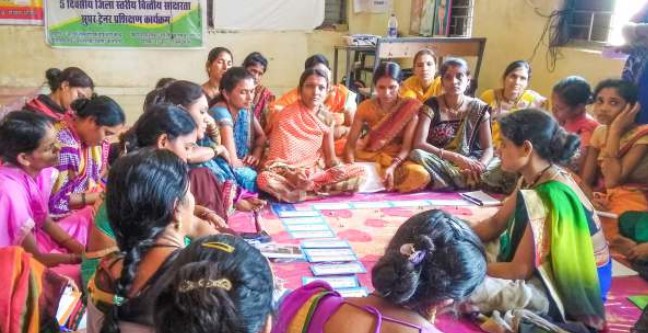
Out of a total of 3,586 operational SHGs, 400 SHGs were newly formed in 2018-19. The SHGs together leveraged INR 218 lakh from banks and other formal financial sources. Post the signing of the MoU with Madhya Pradesh State Rural Livelihood Mission (MPSRLM) for financial literacy and inclusion of SHG women members, the programme was rolled-out to 11 districts.
The “Ab Samjhauta Nahin”, Know Your Rights initiative created awareness on legal rights that safeguard and protect women in 115 colleges in Delhi and Gujarat, directly reaching out to over 14,000 students via interactive workshops. The financial literacy and inclusion project, in partnership with Madhya Pradesh State Rural Livelihood Mission (MPSRLM) and CRISIL Foundation, was rolled out in 765 villages across 11 districts.
9.1 Women Agri-Entrepreneurs
As in other parts of India, it was observed that while women play a critical role in the agricultural sector, they are not recognised as farmers and do not count as decision makers in Munger district of Bihar also. Therefore, ITC’s Mission Sunehra Kal designs and implements a special intervention to empower rural women through knowledge and technology: women-run Agri-Business Centres (ABCs) were established to promote sustainable agriculture practices. In Munger, the ABC engages in a variety of activities like
– hiring out of agri equipment
– nursery raising
– seed production
– capacity building of other farmers and
– linkages to government schemes collectively.
Initially, the women faced hurdles like family restriction, lack of acceptance by other farmers, and difficulty in operating the agri equipment and finances. However, regular and continuous training equipped the women with adequate technical and financial knowledge to operate and manage the ABC independently.
Previously women were recognised as mere helpers in field operations. Post the intervention, however, they were recognised as ‘farmers’ and their collective bargaining power increased as they were given high regard as a group undertaking practices to improve agricultural productivity, whilst reducing cost of cultivation. Due to the success of the intervention, government officials offer the women ABCs the first right to draw the benefit of government schemes and agricultural inputs at subsidised rates.
Economic prosperity of the group and individual women was observed, which triggered improvement in their Human Development Indices (HDI) like access to quality healthcare, children education, nutritious meals, savings account and linkage to social security schemes.
Sunita, one of the hundreds of such beneficiaries summarises: “These days, women have more money in their accounts than the husbands. Whatever they grow and sell, they save it to secure the education of their children, healthcare, housing and dreams.”
10. Education
The Primary Education Programme is directed at kids from weaker sections of society in ITC Group’s factory catchments. The programme covered 1.15 lakh children in 24 districts of 14 states last year. In all, around 6.91 lakh children have been impacted.
The education programme improved the infrastructure in 199 government primary schools. Boundary walls, additional classrooms, toilets and furniture were installed.
11. Skilling & Vocational Training
The Skilling & Vocational Training initiative makes youth job-ready. It operates in 32 districts of 17 states. The most sought-after skills where the initiative runs courses are hospitality, electrical, computer skills and bedside assistance.
ITC Group CSR works with the Welcomgroup Graduate School of Hotel Administration (WGSHA) together with Dr TMA Pai Foundation for skill training. The ITC Culinary Skills Training Centre was launched in Chhindwara in 2014. It trains economically backward youth in becoming chefs; 103 trainee chefs have completed the comprehensive programme.
12. Health & Sanitation
One of the objectives of ITC’s public health and sanitation initiative is prevention of ODC (open defecation). The group constructed 4,443 Individual Household Toilets (IHHT) in 26 districts last year. Till date, a total of 35,916 such toilets have been constructed.
CSR of ITC set up RO (Reverse Osmosis) plants in villages with poor quality water, in three districts of Andhra Pradesh. To provide safe drinking water, 26 new RO plants were installed last year, taking the total up to 127. Over 150,000 rural people have access to potable drinking water through this health and sanitation initiative.
Corporate social responsibility of ITC raised awareness on various health-related issues through a network of 415 women Village Health Champions (VHCs) last year. They reached out to nearly 3.22 lakh women, adolescent girls and school kids. The programme is operational in seven districts of UP and 4 districts of MP. The VHCs hold village meetings, group events and go door-to-door to talk about sanitation, menstrual hygiene, family planning and how to prevent diarrhoea.
Audio-visual aids, games and practical training were leveraged to encourage healthy hygiene habits as part of ITC Group’s ‘Swasth India Mission’. Nearly 19.2 lakh children from 5,247 schools in 12 states were covered in 2019. Additionally, access to handwashing was enabled through the unique ‘ID Guard’ initiative to all the students covered in these 5,247 schools.
Over 77,000 beneficiaries were covered under the Mother and Child Health initiative aimed at improving the health-nutrition status of women, adolescents and children in the catchments of a few of the Company’s factories with high maternal and infant mortality indices. This was achieved by strengthening institutional capacity, promoting greater convergence with existing government schemes and increasing access to basic services on maternal, child, and adolescent health, nutrition and child protection.
13. Solid Waste Management
ITC’s Solid Waste Management Programmes in Saharanpur and Munger focus on “Decentralised Solid Waste Management” i.e. waste management close to the generator through source segregation, and community and home composting to achieve the end objective of “minimal waste to landfill” with community ownership.
